
SEPTEMBER 2007
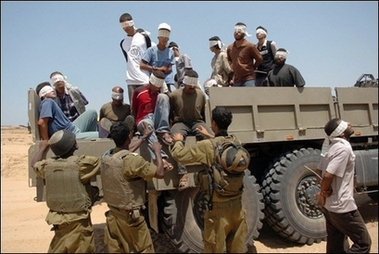
PALESTINE

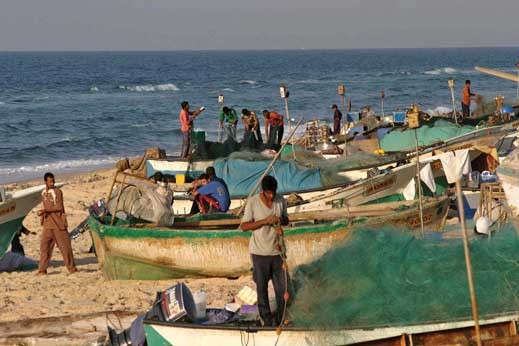
Gaza fishermen repair their boats and nets (Photo M.
Omer).
Gone Fishing
By Mohammed Omer
AS VOCATIONS go, fishing is often rated among the most dangerous, due to the risk posed by the elements. For the fishermen of Gaza, however, man escalates this threat.
Seventy-two-year-old Abu Khalil Al Rebai, nicknamed by locals the “grandfather of the beach,” reclines against the small vessel he captains, the gentle waves of the Mediterranean lapping rhythmically against the hull. Seagulls circle above, looking for scraps, and the sun ebbs toward the horizon. Reflecting, he smiles. Today has been a good day; all his crewmembers have returned unharmed and in good health. No one has been arrested, shot at or killed—yet.
As dusk descends, the shore erupts with activity as fishermen coordinate a little trick proven to attract fish. Each fisherman positions his boat or trawler as close as possible to the beach, lighting it up and creating a patchwork of hulls and sea, causing shadows to dance beneath. The mixture of shadow and light in waves resembles kelp beds, enticing the fish toward the shore with an illusion of safety. Here they are easily caught.
Unfortunately, the lights attract predators as well—the human kind.
Russian Roulette
“We challenge the Israeli bullets,” the old man states defiantly. “But we are only allowed to fish within an eight-kilometer area. Even if we don’t go beyond that, often we are still shot at.”
For this fisherman of over 30 years—one of thousands of Palestinians living in forced exile within Gaza City’s Al Shati refugee camp—housing is a struggle. The father of nine sons, Abu Rebai lives under one roof with his extended family of 36. In most of the world, fishing provides a decent, and often better, income than most other professions. In Gaza, however, due to Israeli-imposed restrictions, international sanctions, limitations on parts, fuel, and even opportunity, Gaza’s fishermen often lose rather than make money.
After getting permission to speak from Al Rebai, his captain, Adham Ahmed, 27, describes the most recent Israeli attack on their fleet.
“The last time we were shot at was just last night,” the crewman says, “less than 24 hours ago. Thank God everyone is alright.
“We have one trawler and four boats,” Ahmed adds. “Fuel can run as much as $400 per night. The problem is when we don’t catch enough fish. We end up broke or in debt.”
Even after its touted “withdrawal,” Israel maintains a near hermetic seal on Gaza. Not only does it control all entries to Gaza—including those on the border with Egypt—but also the air above and the adjacent sea, thus preventing Palestinian fishermen from seeking catches in deeper water or from entering international waters. Gaza’s fishermen thus are forced to depend on whatever may wander into the shallows close to the shore, generally smaller and fewer fish. Should a captain dare to try to fish in deeper international waters, gun barrel diplomacy either sinks his ship or severely damages it. And as Captain Al Rebai noted, even staying within the Israeli-mandated eight-kilometer limit does not guarantee safety.
“Often Israeli warships shoot at us, all of us,” Adham states, motioning with his hands, even when we are inside.”
Israeli attacks against fishermen have increased significantly over the past two to three years, he adds. Walking past the small fleet of boats, the bullet holes become obvious. Each year several fishermen die from these unprovoked attacks, either through direct hits, drowning or the fires caused by the impact of the glowing shells.
Arbitrary arrests—no reason required—present still another hazard.
Gaza Harbor
A little further up the shore, in Gaza harbor, 36-year-old Ibrahim Al Habeel frantically bails water from his listing boat.
“Last night several bullets hit our boat,” he explains between breaths. “It is the sole source of income for more than 15 families.”
Several men patch bullet holes aft, while others repair the bullet-frayed nets.
“Between the damages, lighting and fuel, last night cost us over $1,000. All we caught was a little over three kilos of fish,” Al Habeel explains in frustration, holding up a can of fish to demonstrate his point.
“I’m always in debt,” he states, shaking his head as he returns to bailing. “But I can’t just sit at home and watch my kids starve. It’s our beach and we have a right to fish it.”
According to the Ministry of Agriculture, the indirect damages to Gaza’s fishing industry and economy stand at 54.5 percent—roughly $16.6 million—since the outbreak of the al-Aqsa intifada in 2000.
Nizar Ayash, director of Gaza’s Fishing Syndicate, estimates that there are 3,000 licensed fishermen in Gaza, who provide income for 40,000 people.
“Over the last few days,” Ayesh said in early May, “the number and frequency of Israeli warships patrolling our shore have increased, especially in the southern Gaza Strip along the border with Egypt. Their aim is to harass, arrest and kill our fishermen and prevent them from going onto the beach. Last night two more were arrested. In Rafah more than 50 fishermen were arrested on 13 different boats. Although many were released later, two are still missing.”
“We condemn these crimes against our fishermen.” Ayesh added emphatically.
Mohammed Omer, winner of New America Media’s Best Youth Voice award, reports from the Gaza Strip, where he maintains the Web site <www.rafahtoday.org>. He can be reached at <gazanews@yahoo.com>.
GAZA:
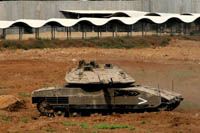 Died waiting: Wael Abu Warda, a 27
years old Palestinian man seeking treatment in an Israeli
hospital for kidney failure, died in August while waiting
at the Erez Crossing between Israel and the Gaza
Strip. Israel had agreed to allow Abu Warda to
travel from Gaza to an Israeli hospital near Tel Aviv for
treatment, but when he arrived at the Erez crossing he
was not allowed through, and died at the crossing, said
Muawiyeh Hassanein, head of the ambulance and emergency
department at Al Shifa hospital and also an official at
the Palestinian Ministry of Health.
Died waiting: Wael Abu Warda, a 27
years old Palestinian man seeking treatment in an Israeli
hospital for kidney failure, died in August while waiting
at the Erez Crossing between Israel and the Gaza
Strip. Israel had agreed to allow Abu Warda to
travel from Gaza to an Israeli hospital near Tel Aviv for
treatment, but when he arrived at the Erez crossing he
was not allowed through, and died at the crossing, said
Muawiyeh Hassanein, head of the ambulance and emergency
department at Al Shifa hospital and also an official at
the Palestinian Ministry of Health.
CONSTANT ATTACKS FROM ISRAEL
In Rafah,
Israeli warplanes fired at least three rockets at the
derelict control tower of Gaza's defunct airport last
week. No casualties were reported. The once
functioning international airport was shut down shortly
after the outbreak of the second Palestinian Intifada in
2000. Since then, it has been used frequently as an
Israeli Occupation Forces strategic military base during
numerous IOF attacks on Rafah citizens and key
infrastructure. In Abasan, east of Khan Younis,
southern Gaza Strip, Israeli helicopter missile fire
early Tuesday morning has killed six Palestinians and
wounded twenty nine, four of whom are reportedly in
critical condition. Medical sources from Khan
Younis’ Nasser Hospital reported that: "the
bodies arrived at hospital torn to pieces due to a direct
hit from a missile." Many of the injured
lay out of reach of Palestinian medical and rescue
services due to intensive continued Israeli gunfire in
the area and the firing at Palestinian ambulances by IOF
tanks. The attack is still taking place in Khan Younies
by tens of tanks and bulldozers invading the area. 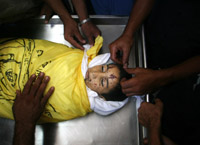
ATTACKS REAP A TERRIBLE HARVEST Brother and sister, Palestinian children, have died after playing in the area of a past attack - an explosion and two children died.
http://rafah.virtualactivism.net/news/todaymain.htm
Mohammed Omer,
photojournalist Aug 06, 2007
OCHA`s
weekly Gaza report
// Watching Gaza collapse
http://www.ochaopt.org/documents/Gaza_Aug23.pdf
SUMMARY POINTS report 15-23 August
1. In the last 72 hours, 12 Palestinians have been killed
by the Israeli Defence Forces (IDF) in the Gaza Strip,
including two children.
2. Fuel supplies resumed on 22 August to the Gaza Power
Station for the first time since 15 August. However,
power cuts are still expected due to a continuing lack of
capacity.
3. Continuing strikes by the Gaza city municipality have
led to thousands of tons of solid waste piling up on
street corners, posing public health concerns to those
living in surrounding areas.
4. Karni, Gaza`s principal crossing point, remains
closed. Basic humanitarian supplies from the private
sector and humanitarian agencies are entering through
Sufa and Kerem Shalom.
5. All Gazan exports have been blocked since mid-June.
Raw materials essential for the Gaza businesses and
economy have not been allowed to enter Gaza, preventing
production of basic supplies. For example, more than
350,000 UNRWA textbooks cannot be printed because Gaza
printing shops lack the requesite raw materials.
6. Paltrade reports that as of 14 August, the direct and
indirect potential losses from the closures have reached
an estimated at $8 million for the furniture sector, $15
million for garments and textiles and $3 million for
processed food. The agriculture sector has estimated
export losses at $16 million. 85% of manufacturing
businesses have now temporarily shut down, with over
35,000 workers laid off. An additional 35,000 workers
have been laid from other sectors including construction,
trade and the service sector.
Hospital refuses order to transfer paralyzed Palestinian girl
http://www.haaretz.com/hasen/spages/898794.htm
By
Reuters
A Jerusalem rehabilitation center is defying a government
order to transfer a Palestinian girl paralyzed in an
Israel Defense Forces attack on militants to a hospital
in the West Bank.
Maria Amin, who turns six on Thursday, cannot get the
care she needs in the Palestinian facility "so she
won't be going anywhere" until her well-being is
assured, said Shirley Meyer of the Alyn Hospital
Rehabilitation Center in Jerusalem.Maria was paralyzed
from the neck down when the car she was traveling in was
caught in a missile attack on a leader of the Islamic
Jihad militant group in Gaza in May last year. Her
mother, grandmother and older brother were killed.She was
taken for treatment to Israel where the Defense Ministry
covered her medical expenses and sponsored her father and
younger brother to live with her at the hospital. She has
now completed a rehabilitation program.Now the ministry
says it is time for her to go. It has promised to pay for
an apartment for the girl and her surviving family in the
West Bank town of Ramallah, where she would be under the
medical care of the Abu Raya Rehabilitation Center.But
Meyer is not satisfied. "I spoke with staff from Abu
Raya and they told me they are not trained or equipped to
handle Maria's care," she told Reuters.Hamdi Amin,
Maria's father, has appealed against the ministry order
and the Supreme Court has said she cannot be transferred
until a hearing is held next month.
Maria is able to move around in a wheelchair controlled
by a joystick she guides with her chin, but her doctors
say she will remain paralyzed from the neck down and be
dependent on a respirator to help her breathe for the
rest of her life."I want to stay here and build a
house here. I don't want to leave," Maria said in
Hebrew, which she learned during her hospital stay.At
Alyn Hospital, Maria's treatments include weekly
hydrotherapy sessions in a pool and computer therapy.
The Defense Ministry said in a statement that moving
Maria to the Palestinian hospital would allow her to
reintegrate into "an environment that is natural for
her". It said the Abu Raya facility "can meet
all of Maria's needs".
Adi Lustigman, Amin's lawyer, said Israel was mistaken if
it feared that allowing Maria to stay would encourage
other Palestinians hurt in IDF strikes to seek long-term
medical treatment in Israel. "Because of the
uniqueness of this case, the severity of the injuries and
what happened to her family, the defense department can
decide to help her without worrying about setting a
precedent," Lustigman said.
A
Mother of Seven Prisoners
By
Hekmat Bessiso
31
August, 2007
Countercurrents.org
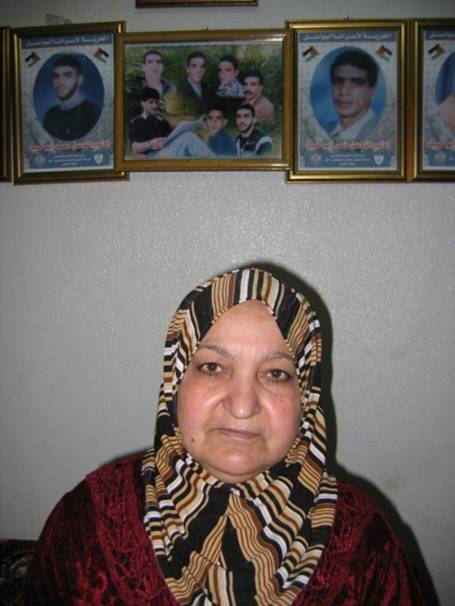
Latifah Naji Abo Homeed, 61 years old, lives in Al Am’ary Refugee Camp in the city of Ramallah – Palestine. Of her 10 children, one killed during 1994 by Israeli military and seven have been imprisoned by Israel . She longs to see them but has only their photos for comfort. She has asked to be taken to prison herself so that she can live with them.
Latifah
remembers how her son Nasr loved to play with his first
son; his wife delivered his second child while he was in
prison. She misses Basil’s jokes, Naseir’s
kindness, and Muhamed’s helpfulness. Her youngest,
Jehad, was always missing his older brothers, and now he,
too, is a prisoner, awaiting his own conviction. Sharif
is engaged and dreams to be free and marry his bride.
Islam was known for his beautiful eyes; many girls tried
to win his attention by being nice to Latifah.
Latifah does not attend any weddings because she is
afraid she will not be able to control her tears. She
despairs that she will die before she can witness her own
sons’ weddings.
Though Latifah has not given up hope that her sons and
other Palestinian prisoners will be freed, she often
feels that no one remembers them and no one is fighting
for them. She prays, searching for the strength and
patience to endure life under Occupation and the unending
separation from her sons. The home Latifah shares with
her husband has been demolished twice in the last ten
years. She and her husband, 67 years old, have recently
opened a small candy store in their home to try to earn
money and fill their free time.
This is the story of countless Palestinian women, who
hope for the freedom of their sons, husbands, and
brothers with every breath.
Latifah Naji’s imprisoned sons:
Name Age Year imprisoned Sentence
Naseir 36 years – single 2002 7 lifers + 50 years
Nasr 34 years – married with 2 children 2002 5 lifers
Basil 29 years - single 2004 4 years + 4 months + $2500
Muhamed 26 years - single 2002 2 lifers + 30 years
Islam 22 years - single 2004 5 years + 6 months + $2500
Jehad 19 years - single 12/2006 Not yet
Translated by Adib S Kawar
September 4th, 2007 | Posted in Press Releases, Bil'in
Village, ISM Media Alerts
MEDIA ADVISORY: A Victory for the residents of Bil'in
village
4th September 2007:
Following popular non-violent resistance through joint
struggle between Palestinian, Israeli and international
activists, a court decision has been made in favor of the
petition by Bilin village to change the current route of
the Apartheid Wall.
The court decision dictates that the military are obliged
to plan and implement a new route for the wall. It has
been ordered that the new path will allow for all
Palestinian agricultural land to be on the Palestinian
side. Furthermore, the court has ordered that the state
should not take into consideration the area earmarked for
Stage B of the planned expansion of Matityahu East.
During the proceedings, it was of note that the court
made a rarely heard reference to military considerations
and security. The court stated that in respect of
security considerations, the current route of the wall
runs in a topographically inferior path thus indicating
that the original route had been planned with the prime
consideration being the planned expansion of the
settlement rather than of security.
The Supreme Court decision comes after years of continued
struggle and resistance to the illegal confiscation of
village lands. It is seen as a victory for the path of
non-violent resistance and joint initiative from both the
Palestinian and Israeli participants.
Although today's decision is seen a victory in the
struggle against oppressive consequences of the Israeli
Occupation and a victory for the villagers of Bilin, it
is important to recognize that the route of the wall
still deviates from internationally recognized armistice
lines and is still in violation of international law,
resolutions and advisories made within the International
Court of Justice and within the UN Security Council.
For more information please go to the Israeli Supreme
Court Website, www.court.gov.il
(unfortunately the decision is only in Hebrew)
Alternatively please contact:
Neta Golan: 059 8 184169
Attorney Michael Sfard: 0544 713930 alternatively 03 607
345
[newprofile message1389]